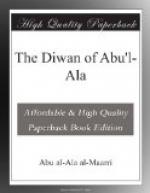And the worship of Saturn, with other deities, is about a hundred years later resented by Clotilda, says Gregory of Tours, when she is moving Chlodovich her husband to have their son baptized. When the little boy dies soon after baptism, the husband does not fail to draw a moral. But misfortunes, in the language of an Arab poet, cling about the wretched even as a coat of mail (quatrain 6) is on the warrior. This image was a favourite among the Arabs, and when Ibn Khallikan wants to praise the verses of one As Suli, he informs us that they have the reputation of delivering from sudden evil any person who recites them frequently. When this evil is complete, with rings strongly riven, it passes away while he thinks that nothing can dispel it. . . . We have mention in this quatrain of a winding-sheet, and that could be of linen or of damask. The Caliph Solaiman was so fond of damask that every one, even the cook, was forced to wear it in his presence, and it clothed him in the grave. Yet he, like other Moslems (quatrain 10), would believe that he must undergo the fate recorded in a book. The expression that a man’s destiny is written on his forehead, had its origin without a doubt, says Goldziher, in India. We have remarked upon the Indian ideas which had been gathered by Abu’l-Ala at Baghdad. There it was that he enjoyed the opportunity of seeing ships (quatrain 11). He spent a portion of his youth beside the sea, at Tripoli. But in the capital were many boats whose fascination he would not resist,— the Chinese junks laboriously dragged up from Bassora, and dainty gondolas of basket-work covered with asphalt.[4] However, though in this place and in others, very frequently, in fact, Abu’l-Ala makes mention of the sea, his fondness of it was, one thinks, for literary purposes. He writes a letter to explain how grieved he is to hear about a friend who purposes to risk himself upon the sea, and he recalls a certain verse: “Surely it is better to drink among the sand-heaps foul water mixed with pure than to venture on the sea.” From Baghdad also he would carry home the Zoroastrian view (quatrain 14) that night was primordial and the light created. As a contrast with these foreign importations, we have reference (quatrain 15) to the lute, which was the finest of Arabian instruments. They said themselves that it was invented by a man who flourished in the year 500 B.C. and added an eighth string to the lyre. Certainly the Arab lute was popular among the Greeks: [Greek: arabion ar ego kekineka aulon], says Menander. It was carried to the rest of Europe by crusaders at the beginning of the twelfth century, about which time it first appears in paintings, and its form persisted till about a hundred years ago.[5] But with regard to travels (quatrain 18), in the twenty-seventh letter of Abu’l-Ala, “I observe,” says he, “that you find fault with travelling. Why so? Ought not a man to be satisfied with




